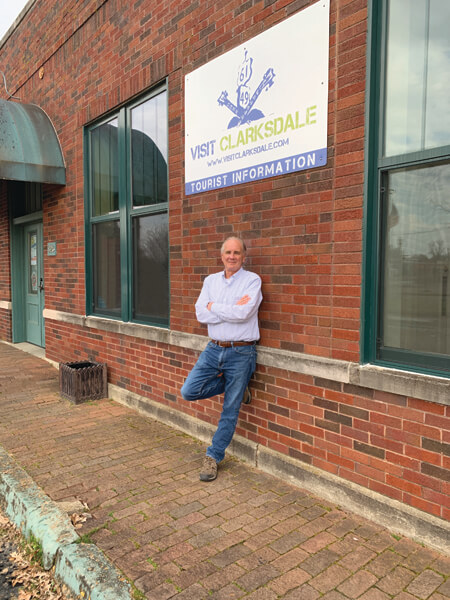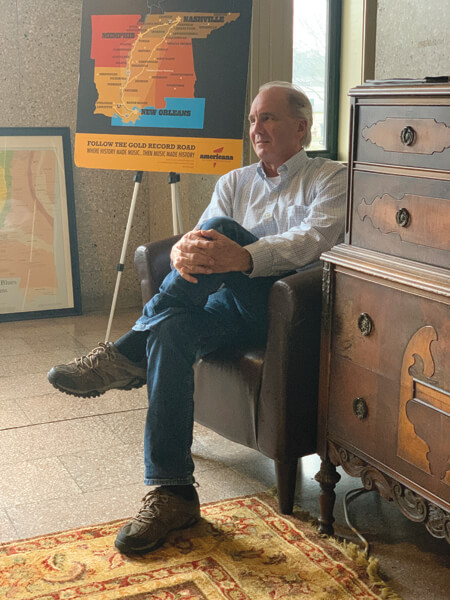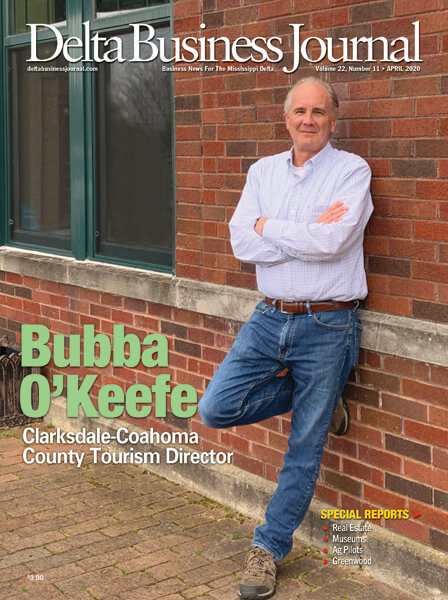By Becky Gillette • Photography by Madge Howell
Clarksdale-Coahoma County Tourism Director Bubba O’Keefe is not only responsible for promoting Clarksdale to the world, but also has been intensely involved with restoring numerous buildings downtown and helping create the vibe that has made Clarksdale famous as a blues tourism destination not just in the U.S., but in a wide range of countries from those in Europe to South America to Australia.
“Bubba is a very unique person to have as our tourism director because so much of his passion and drive come from working on projects such as renovating buildings downtown and encouraging people to open businesses there,” says Roger Stolle, the owner of Cat Head Delta Blues and Folk Art. “He renovated or constructed a number of buildings that have opened in the downtown area in the past fifteen years such as Yazoo Past, Sunflower Lofts, the bank and the Traveler’s Hotel. These are all projects that would not have happened without Bubba O’Keefe.”

Stolle was a tourist visiting Clarksdale when he first met O’Keefe. O’Keefe’s enthusiasm for the rich blues heritage of Clarksdale and the potential for revitalizing the downtown helped sell Stolle on moving to Clarksdale. Stolle ended up buying the building from O’Keefe that now houses Cat Head.
“He has been the driving force in keeping Clarksdale front and center as the World Capital of the Blues,” says Stolle. “He had to hustle and try to get partners, raise money, and either do the renovation work himself or get the right people as contractors. He helped people getting historic renovation tax credits. He was hands on making things happen.”
The Juke Joint Festival—which has created a huge, positive economic impact on Clarksdale—was co-founded by Stolle and O’Keefe and is a signature event that has drawn tens of thousands of visitors from around the world.

O’Keefe is a Clarksdale native who has lived there his entire life except for five years in Jackson. His primary business background has been in construction.
“I started remodeling homes in Clarksdale when I left college,” O’Keefe says. “I was interested in preserving older houses, but my main goal was to make Clarksdale a better place. I would take condemned houses and renovate them up to standard. I did that for many years.”
In those days in the early 1980s, he also had a real estate company. But interest rates were at twenty-one percent, which slowed home sales. He married Melissa Strider from Tallahatchie County, then, because work was slow in Clarksdale, moved to Jackson.
“I went to work as a project manager for a large construction company,” says O’Keefe. “Then I went to work for a shopping center developer. After five years in Jackson, we wanted to come back to the Delta. Both my wife and I wanted to be close to family. My mother was aging. As far as changing things, I felt like I could have more of an impact in Clarksdale than in Jackson. I wanted to come back here to be a part of the community.”
Around 2000, he started getting involved with buying and renovating buildings downtown.
“I saw there was no life downtown,” he recalls. “There was hardly anyone down there, really. I renovated one building and then another. We opened up businesses in them. My wife and I both had retail businesses in addition to me doing construction.”

His intention was to try to change Clarksdale by reclaiming buildings one building at a time. The idea wasn’t to retain ownership, but instead get buildings renovated to the point that other people could see the potential and then take over. He also worked with others of the same mindset to remake Clarksdale into a lively place for tourists and where locals could have thriving businesses.
Over twenty years, the downtown transformed with a diverse mix of businesses opening including art galleries, restaurants, coffee shops and hotels. O’Keefe says it was rewarding not only to see life to come back to downtown, but to see people from all over the country—and the world—buy buildings and move to Clarksdale.
“They are the ones who have made Clarksdale what it is, they are the new Clarksdale,” O’Keefe says. “It wasn’t me or the buildings. It was a very diverse, organic movement made up of private businesses and non-profit organizations that have had a major positive impact on the community. People move to Clarksdale and purchase buildings to make a living at a business, but everyone’s goal also seems to make it a better place.”
O’Keefe has been a music fan after seeing The Beatles live in concert when he was in the third grade. Like many children of the 60s and 70s, music was a big draw. He was also a friend of Sid Graves, the founder of the Delta Blues Museum. O’Keefe worked as a volunteer with the Blues Museum helping with photos and negatives. He worked out of a darkroom at the library.
“One of the greatest blues musicians, Fred McDowell, worked for my father pumping gas,” O’Keefe said. “I grew up knowing him, but I didn’t know his significance in the music world. He kept his day-to-day job and music world separate. I knew Big Jack Johnson, Early Wright and C.V. Veal from Clarksdale.”
O’Keefe wasn’t taught the legacy of blues music in school. But when he learned how many people from Clarksdale were famous in that arena, it changed his life. He considers blues music “the low-hanging fruit.” And having a major festival like the Juke Joint Festival was a natural outgrowth.

“People were already coming here for the blues music,” he says. “We realized we could do three things with the Juke Joint Festival: bring business to businesses, bring local people in contact with our visitors so locals had a better understanding of the economic impact of blues tourism, and have a kid-friendly environment. Therefore, we got into racing pigs, monkeys riding dogs and other things to cater to families.
Since the first Juke Joint Festival seventeen years ago, other festivals have started up in Clarkdale.
“They each have their own personality, and all add to the mix of Clarksdale,” O’Keefe says. “Our seven nights of live blues music started organically. We decided we could have live music and incorporate it into things like an art gallery. None of this was done with the idea of making a lot of money. People wanted to make a profit, do well with it, but the main principles were to impact a community in need. Downtown was dead. Blues musicians were dying.
“And now we have Kingfish, Big “A” Anthony Sherrod, Lucious Spiller and others that go on tour internationally but always come back home to Clarksdale. Some of these artists attended the Blues Education Program sponsored by the Delta Blues Museum. We also have numerous non-profits doing really great work. People attracted to being here saw a need and a higher purpose making Clarksdale and Coahoma County better.”
O’Keefe is also known as a great storyteller. That doesn’t hurt when selling Clarksdale to the world. It comes in handy for things like representing Clarksdale at tourism trade shows. People love to see someone passionate about something they care about. This in turn gets them excited about wanting to come and experience Clarksdale.

Visit Clarksdale is under the Coahoma County Tourism Commission and the Coahoma County Board of Supervisors.
“It was brilliant how we were set up,” says O’Keefe, who started his present job in January 2019. “We get our revenues from tax collected off hotels and food and beverage sales. We also work closely with the City of Clarksdale and the Clarksdale-Coahoma Chamber of Commerce & Industrial Foundation. We all work together promoting Clarksdale and Coahoma County.”
Whether at tourism trade shows in the U.S. or foreign countries, he finds that Clarksdale is well known and holds its own with some of the country’s other major travel destinations.
The cancellation of the Juke Joint Festival this year due to the coronavirus concerns was very disappointing. But once the virus threat is over, Clarksdale is poised to build on its success so far. O’Keefe wants to see more tourism developed with ag tourism, civil rights, ecotourism, Tennessee Williams, more development of Mississippi River attractions and promotion of additional historical and cultural attractions.
“There is plenty more that can be done to develop and grow this market,” says O’Keefe. “And that is what we do. Our office is closed during the virus outbreak, but I’m still here to help with any questions or concerns from travelers. Some are still out on the road and don’t know local information. While limiting personal contacts, we have made it available through our website. We will still be promoting Clarksdale to the world outside of Clarksdale. We want to bring Clarksdale to the people where ever they are and to let them know that we are working on new ideas for them to experience when this crisis is over! This is our goal through this crisis.”
For O’Keefe, the position is not work; it is a passion.
“It took me only 40 years to be groomed for this role,” he says. “I’m very honored and privileged to be here in this role.”

